

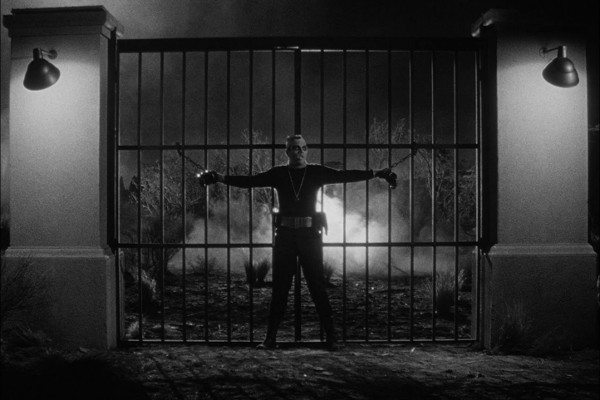
Update: December 2018 - Some amendments added, along with all-new screen captures from the Blu Ray release.
Cancelled midway through the season after just 17 episodes had been made, the second season isn't without its highs - indeed, the top-ranked story here may well be the greatest episode of all. But ranking these episodes is, for the first ten or eleven entries, almost pointless - none of them are more than passable fluff at best. September of this year marks the fiftieth anniversary of the second season, though, unlike the first, it's not one to celebrate. Join me as I rank all seventeen episodes from worst to best...

A cartoonesque 2D alien falls through a "time warp" and visits an optician who he hopes will make him special contacts lenses so he can see his way back home. What's surprising about all this is that only season one's Controlled Experiment is listed as a comedy episode, and so we must take this tale, with its hammy acting, poor script, laughable character motivations and chronic direction... and realise that they intended it to be taken seriously.
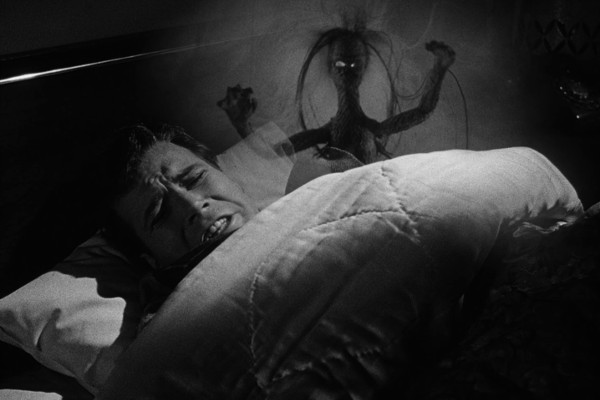
One of the series' most tedious instalments, this one sees a one-note plot dragged out over 50 minutes as William Shatner's Venus pilot is haunted by dreams of what looks like a kewpie doll. As he begins to develop scaled hands, his wife grows ever more wooden, her dialogue ever more syruppy, and their romantic overtures, while chaste due to censor restrictions, never remotely convincing. Shatner, for his part, delivers possibly his worst-ever "acting" performance in the entire history of his career... quite a considerable feat, when you really sit and think about it.
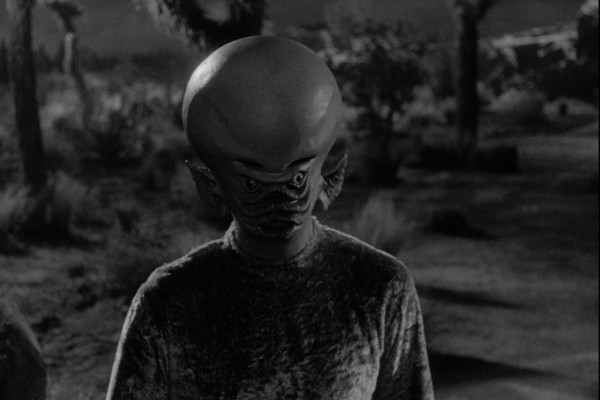
"You gain nothing by suicide."
Keeper of the Purple Twilight is notable as the last episode before The Outer Limits' budget got cut yet again. Season two producer Ben Brady was having to make do with less money than his first season forbears, and after this point the budget was hacked yet again by $10,000 per episode ($76,335 in today's money) before the plug was finally pulled five episodes later.
It's a shame, because the plot to this one starts out as really rather good. A man drives home late at night with the thought of ending his life... only for an alien to appear in the back seat of his car to try and talk him out of it. It's a startling conceit, and what looks like a terrific, original and off-beat episode. Add to this the alien, with a kind eye, looking genuinely unsettling, and the only thing that could go wrong is if the alien traded emotions with the Earth man and went on a 'what is this emotion called love?' exploration, before kindergarten analogies of nuclear war and a laser zap runaround. Oh. Wait...
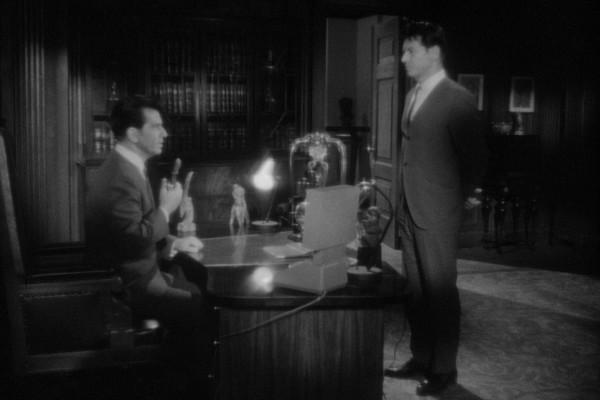
Depending on your tastes, there are perhaps just three changes made during season two that could be regarded as improvements over the first: The pre-credits "teasers", which invariably gave away major plot points, are discarded in favour of in-story action before the opening credits; the gradually tiresome opening credits are considerably shortened (though have tacky 'sci-fi' music laid over the top of them); and the continual obsession with "bears" is reduced.
This last point is paramount with The Duplicate Man. Adapted from a 1951 short story "Goodnight, Mr James" by Clifford D. Simak, it's perhaps quite worthwhile on paper. A research scientist smuggles back an alien killing machine from the stars, and, when it threatens to reproduce, he buys a black market clone of himself to kill it. Not only do we get confrontation between clone and alien, but the clone also begins to question his own memories and right to life, and goes on an existential odyssey. Sounds pretty good, doesn't it?
Sadly, all the "actors" involved are wooden, the exposition creaks and the "alien killing machine"... it's a man in a giant chicken outfit with a kangaroo's tail that "savagely attacks" people by slam diving them in wrestling holds.
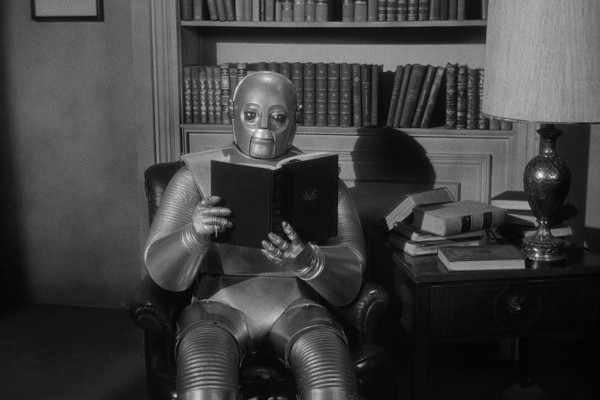
The initial reaction to the title of this one is, perhaps, to believe that it's a steal from the very famous Asimov book. Yet Asimov himself protested against his 1950 short story collection being given this title, as he was well aware that I, Robot was initially a 1939 story from Earl and Otto Binder. Asimov was inspired by it, and it's adapted without major changes to the episode here.
This pretty much sets out the level of The Outer Limits season two. Whereas the first season, in its finest moments, had tried to push the boundaries, season two could bring a pre-WWII story to life without any significant changes, or any alteration of the tone of the show.
In its defence, then I, Robot has some verve and pace that a lot of the other season two episodes lack, and Leonard Nimoy appears to be having fun as a cynical reporter. But it lacks the layers and sophistication of the best of the programme and the robot is unintentionally hilarious, not to say dated in an appalling way.
However, it seems at least one person disagreed with these assertions... when series was brought back in the mid-1990s they remade this episode with Nimoy in the role of the lawyer.
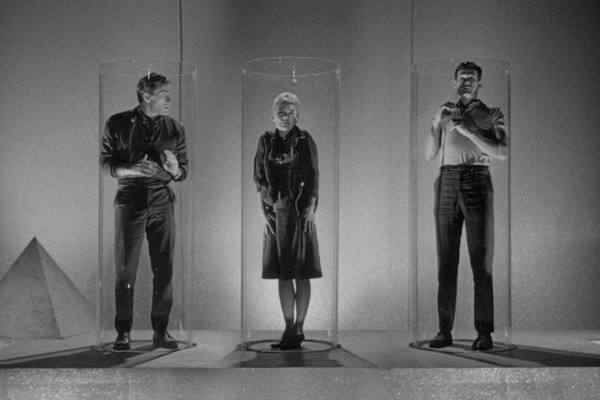
The only truly notable element of The Probe is that it was the last episode of The Outer Limits. The pilot for the series was made on $213,000 back in 1963, whereas new season two producer Ben Brady was having to make do with an average of $120,000. The Probe, a hastily-written episode, was cheaply knocked off for around $70,000, or around $520,000 in today's money. After it was made, ABC decided to pull the series and that was it, until thirty years later when Showtime brought it back for colour stories.
The Probe isn't a terrible piece of television... just about... and Peter Mark Richman's amazing leaps of deduction based on pretty much nothing whatsoever are quite amusing. But it's flatly shot, unambitious pulp SF that could have been made any time from 1930 and features a bunch of uninteresting stock characters that could have walked off the set of any TV show or movie.
The paths that Joe Stefano carved for the series have been glossed over forever, and what remains is the bare bones of a series with nowhere to go. Aside from the top three stories of season two - arguably the top four or five - there was nothing that made it stand out from the crowd, and nothing to make you believe it was the same, expressionistic and psychosexual minefield of season one at its finest. Episodes like The Probe aren't awful, but pulling the plug seems, in all honesty, like it was the kindest act of all.
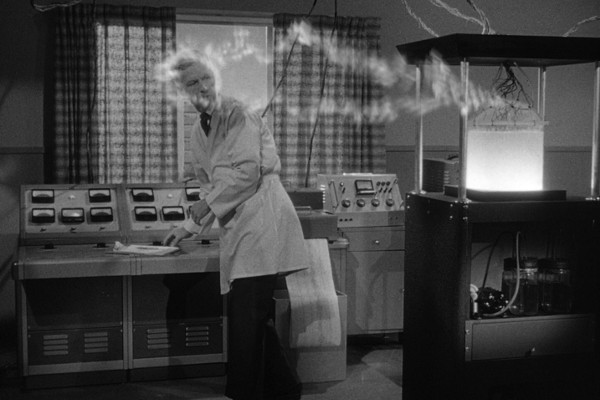
Titles of episodes can be such important, and misleading, things. Take first season entry Production and Decay of Strange Particles. Arguably an enigmatic, even enticing, name for an episode. But it masks one of pure tedium.
And so the title The Brain of Colonel Barham seems to suggest an oddball, goofy flight of fancy. Quirky, even. Yet the actual episode is quite thoughtful and, for a story about a terminally ill man dedicating his brain to science, treated quite seriously.
It does begin to get more outlandish and tedious as it goes on, though to say more would spoil the plot... and also, I confess, I was drunk when I saw this one and accidentally wiped my notes. While The Anorak Zone doesn't advocate alcohol abuse, sometimes it's best to put your hands up and admit that season two of The Outer Limits is an easier experience when viewed under the influence.
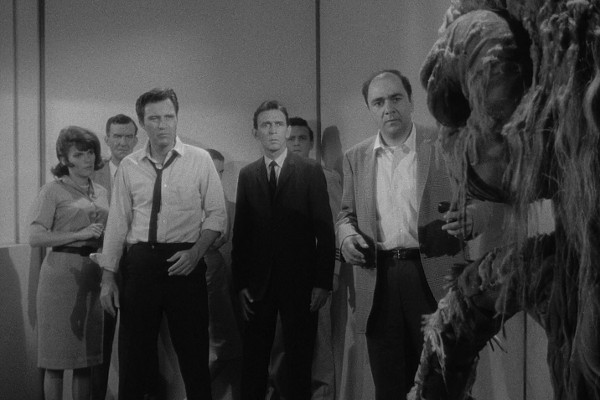
A fair number of places on the net cite Counterweight as possibly the worst episode of the lot, but I'd put it above a fair few, including Second Chance, the season one effort with which it bears plot similarities. There we also got unlikely human characters spilling all their neuroses amongst a "it started out as a pretend space flight and then turned into a real one" setting.
The plot to this one is essentially the same, though with a bit more genuine angst. That said angst comes out in ridiculous lines like Jacqueline Scott wondering what it's like to be a real woman, but it seems rooted in a more realistic base.
Sadly, the ending really drops what is already only so-so into something far more missable: The Day The Earth Stood Still must have been an astonishingly influential movie if you consider at how many episodes of The Outer Limits end with aliens telling Earthmen that they're too aggressive and into war, etc. This one ends the same way, with a silly, motionless monster that is borne from child-like stop motion trickery.
It's all an unnecessary addition to what was a reasonable script, based on a 1959 short story by Jerry Sohl in Worlds of If magazine. The worst thing about all this is that it greeted viewers on boxing day 1964, and so is the nearest The Outer Limits came to a Christmas episode... the disappointment around festive homes must have been palpable.